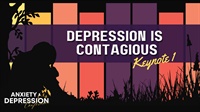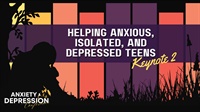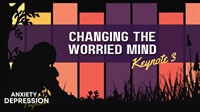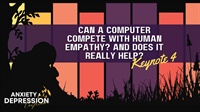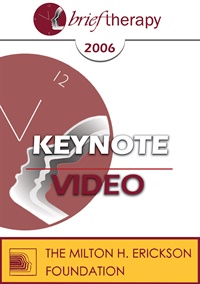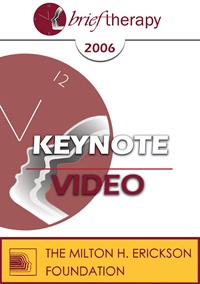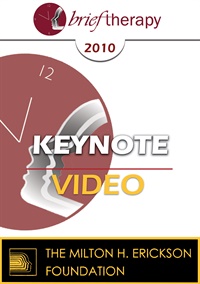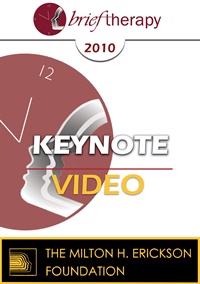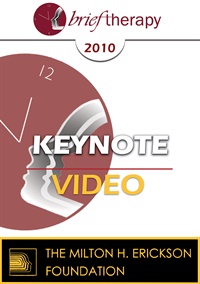- Average Rating:
- Not yet rated
- Topic Areas:
- Keynotes | Cognitive Psychology | Depression | Hypnosis
- Categories:
- Anxiety and Depression Conference 2024
- Faculty:
- Michael Yapko, PhD
- Course Levels:
- Master Degree or Higher in Health-Related Field
- Duration:
- 1:03:13
- Format:
- Audio and Video
- Original Program Date:
- Sep 14, 2024
- Short Description:
- This session reframes depression as a socially transmitted condition rather than simply a biochemical disorder. Yapko reviews research on medication limits, placebo effects, and the impact of factors like social media, COVID, and cognitive style. Participants learn how critical thinking, resilience skills, and experiential methods like hypnosis can help clients move beyond passive treatments toward active recovery.
- Price:
- $59.00 - Base Price
- Average Rating:
- Not yet rated
- Topic Areas:
- Keynotes
- Categories:
- Anxiety and Depression Conference 2024
- Faculty:
- Lynn Lyons, LICSW
- Course Levels:
- Master Degree or Higher in Health-Related Field
- Duration:
- 1:01:24
- Format:
- Audio and Video
- Original Program Date:
- Sep 14, 2024
- Short Description:
- There’s no escaping the dire reports about the high rates of anxiety and depression in teens and young adults. The theories about what is driving the increase are multiple and overlapping, from the pandemic to social media to parenting to the state of the world. And while therapists obviously want to help, are we truly doing what works? Or are we buying into the same mental health trends and assumptions as the young people we’re trying to help? In this keynote, Lynn encourages mental health providers to question the myths, trends, and sometimes surprising approaches to addressing youth mental health and to focus our efforts on treatment based on action, connection, and accurate psychoeducation.
- Price:
- $59.00 - Base Price
- Average Rating:
- Not yet rated
- Topic Areas:
- Keynotes | Anxiety | Cognitive Behavior Therapy (CBT)
- Categories:
- Anxiety and Depression Conference 2024
- Faculty:
- Reid Wilson, PhD
- Course Levels:
- Master Degree or Higher in Health-Related Field
- Duration:
- 1:00:51
- Format:
- Audio and Video
- Original Program Date:
- Sep 15, 2024
- Short Description:
- This session focuses on treating generalized anxiety disorder through a unifying framework for anxiety disorders. Key concepts include distinguishing “signal” from “noise” worries and breaking the cycle where worry suppresses physical activation. Emphasis is placed on shifting mindset, accepting uncertainty, and using proactive behavioral strategies to reduce anxiety’s hold and build long-term resilience.
- Price:
- $59.00 - Base Price
- Average Rating:
- Not yet rated
- Topic Areas:
- Keynotes
- Categories:
- Anxiety and Depression Conference 2024
- Faculty:
- David Burns, MD
- Course Levels:
- Master Degree or Higher in Health-Related Field
- Duration:
- 1:00:58
- Format:
- Audio and Video
- Original Program Date:
- Sep 15, 2024
- Short Description:
- Karl Rogers said that empathy is the “necessary and sufficient condition” for therapeutic change. Aaron Beck said that Rogers was wrong, and that empathy was necessary but not sufficient, because cognitive techniques are also needed for change. Albert Ellis said that they were both wrong. He insisted that empathy wasn’t necessary, sufficient, or desirable, because patients have to do their “damn homework” if they want to get better. Who was right? And what happens when a computer provides the empathy? And how might this affect your clinical practice? Dr. Burns will describe the unexpected results of a recent beta test with the Feeling Great App.
- Price:
- $59.00 - Base Price
- Average Rating:
- Not yet rated
- Topic Areas:
- Keynotes
- Categories:
- Anxiety and Depression Conference 2025
- Faculty:
- Michael Yapko, PhD
- Course Levels:
- Master Degree or Higher in Health-Related Field
- Duration:
- 1:05:29
- Format:
- Audio and Video
- Original Program Date:
- Sep 27, 2025
- Short Description:
- Cognitive psychology, the study of how people think, has given rise to new understandings about how people gather and use information. This includes how people decide, usually at a level outside of awareness, what is salient to pay attention to in a given context and, likewise, what is essentially irrelevant. When people get sidetracked into irrelevancy, paying too much attention to what doesn’t really matter and too little attention to what does, their perceptions and responses naturally lead them astray. More important, when someone’s perspective is so global or over-general that they simply don’t know how or what to decide, they are far more likely to make poor decisions on the basis of hurt feelings, old history, misconceptions, or blind faith.
- Price:
- $59.00 - Base Price
- Average Rating:
- Not yet rated
- Topic Areas:
- Keynotes
- Categories:
- Anxiety and Depression Conference 2025
- Faculty:
- David Burns, MD
- Course Levels:
- Master Degree or Higher in Health-Related Field
- Duration:
- 1:00:42
- Format:
- Audio and Video
- Original Program Date:
- Sep 27, 2025
- Short Description:
- Burns examines competing theories about the causes of depression and anxiety, from chemical imbalance to trauma to cognitive distortions. Drawing on structural equation modeling and large app-based data sets, he presents evidence that negative thoughts have a powerful causal impact on emotional suffering. Blending research findings, clinical stories, and discussion of AI-assisted therapy, the talk challenges long-held assumptions and argues for a more precise science of psychotherapy.
- Price:
- $59.00 - Base Price
- Average Rating:
- Not yet rated
- Topic Areas:
- Keynotes
- Categories:
- Anxiety and Depression Conference 2025
- Faculty:
- Lynn Lyons, LICSW
- Course Levels:
- Master Degree or Higher in Health-Related Field
- Duration:
- 1:06:32
- Format:
- Audio and Video
- Original Program Date:
- Sep 28, 2025
- Short Description:
- Our current culture likes to talk (and talk and talk) about anxiety and depression, with seemingly limitless voices weighing in on what to do, what to buy, and what to avoid. But based on rising trends of loneliness, anxiety and depression in our young people, this flood of approaches is not enough. In fact, they’re often making things worse. What do teens and their parents need to know about anxiety and its common path into depression? How do we move beyond “mental health awareness”? Misinformation, self-labeling, and bad advice are everywhere, making the goal of developing emotionally and socially resilient teens increasingly difficult. Mental health providers must focus on creating effective school and family plans that don’t “do the disorder” but instead focus on the development of skills such as problem solving, social connection, emotional management and autonomy. The goal is a thorough understanding of HOW these disorders operate...
- Price:
- $59.00 - Base Price
- Average Rating:
- Not yet rated
- Topic Areas:
- Keynotes
- Categories:
- Anxiety and Depression Conference 2025
- Faculty:
- Reid Wilson, PhD
- Course Levels:
- Master Degree or Higher in Health-Related Field
- Duration:
- 58:21
- Format:
- Audio and Video
- Original Program Date:
- Sep 28, 2025
- Short Description:
- When we adapt cognitive-behavioral strategies to fit the needs of those with social anxiety, then treatment becomes significantly more efficient and effective. We will highlight what to seek in the initial interview, presenting to clients their underlying beliefs that lead to their flawed goals, the simplest cognitive restructuring tasks, the why and how of teaching clients paradoxical interventions, setting up and then debriefing exposures and exposure simulations, and the benefits and principles of group work.
- Price:
- $59.00 - Base Price
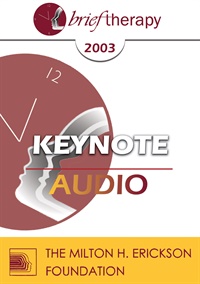
- Average Rating:
- Not yet rated
- Topic Areas:
- Keynotes | Psychotherapy | Trauma | Memory | Post-Traumatic Stress Disorder (PTSD) | Storytelling | Constructive Narrative
- Categories:
- Brief Therapy Conference | Brief Therapy Conference 2003
- Faculty:
- Donald Meichenbaum, PhD
- Duration:
- 54:14
- Format:
- Audio Only
- Original Program Date:
- Dec 11, 2003
- Short Description:
- The assessment and treatment implications of patient victimization will be critically examined from a constructive narrative perspective. A phase-oriented cognitivebehavioral treatment model will be presented for adults with PTSD, Complex PTSD, and related co-morbid disorders. A critical analysis will be offered of various forms of so-called "memory work" interventions.
- Price:
- $15.00 - Base Price
- Average Rating:
- Not yet rated
- Topic Areas:
- Keynotes | Brief Therapy | Mind-Body | Psychotherapy | Neuroscience
- Categories:
- Brief Therapy Conference | Brief Therapy Conference 2006
- Faculty:
- Daniel Siegel, MD
- Course Levels:
- Master Degree or Higher in Health-Related Field
- Duration:
- 1:01:01
- Format:
- Audio and Video
- Original Program Date:
- Dec 07, 2006
- Short Description:
- This keynote address will provide an overview of the interdisciplinary view of the mind and mental health. Over 60,000 mental health providers have been asked about their formal education in these areas and less than 5% have had seminars defining these two basic aspects of psychotherapy. This presentation will offer a view based on science of the definition of the mind and well-being and explore ways in which brief therapy can foster rapid and lasting change.
- Price:
-
Sale is $29.00
price reduced from Base Price - $59.00
- Average Rating:
- Not yet rated
- Topic Areas:
- Keynotes | Therapist Development | Brief Therapy
- Categories:
- Brief Therapy Conference | Brief Therapy Conference 2006
- Faculty:
- Erving Polster, PhD
- Course Levels:
- Master Degree or Higher in Health-Related Field
- Duration:
- 52:24
- Format:
- Audio and Video
- Original Program Date:
- Dec 08, 2006
- Short Description:
- Through the special focus which therapy technique induces, therapists often lose touch with the power of such ordinary experiences as humor, friendliness, self-disclosure, approval/disapproval, banter, etc. via a live therapy session, Polster will show how these exchanges may join technique to tighten up the therapy experience and speed up the process.
- Price:
-
Sale is $29.00
price reduced from Base Price - $59.00
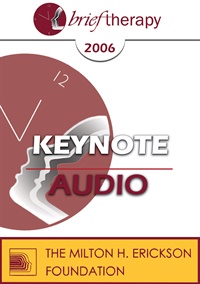
- Average Rating:
- Not yet rated
- Topic Areas:
- Keynotes | Multicultural | Brief Therapy | Professional Practice | Training
- Categories:
- Brief Therapy Conference | Brief Therapy Conference 2006
- Faculty:
- Patricia Arredondo, EdD
- Duration:
- 50:58
- Format:
- Audio Only
- Original Program Date:
- Dec 09, 2006
- Short Description:
- This keynote traces why multicultural counseling competencies are not optional add-ons, but central to ethical, effective psychotherapy. Grounded in history, lived experience, and clinical examples, it examines cultural encapsulation, power, identity, and the limits of Western models when culture is ignored. Therapists are invited to rethink how history, immigration, religion, gender, and economics shape the therapeutic encounter, and how cultural humility and self-reflection expand both clinical skill and relevance.
- Price:
- $15.00 - Base Price
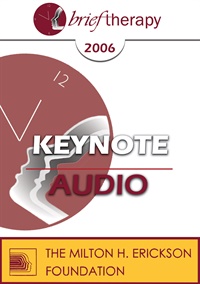
- Average Rating:
- Not yet rated
- Topic Areas:
- Keynotes | Brief Therapy | Psychotherapy | Therapist Development
- Categories:
- Brief Therapy Conference | Brief Therapy Conference 2006
- Faculty:
- Nicholas Cummings, PhD
- Duration:
- 1:14:34
- Format:
- Audio Only
- Original Program Date:
- Dec 09, 2006
- Short Description:
- Psychotherapy has the lowest remuneration among all health professions, according to U.S. Labor statistics. Most practices are languishing, while others are prospering. What are the elements that make the difference between success and failure? Hear from psychotherapy's leading entrepreneur how innovation and its implementation can not only change your practice, but also enable you to make a difference.
- Price:
- $15.00 - Base Price
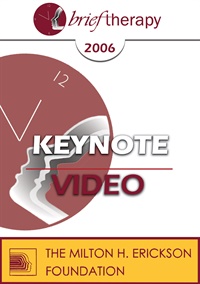
- Average Rating:
- Not yet rated
- Topic Areas:
- Keynotes | Abuse | Violence Prevention
- Categories:
- Brief Therapy Conference | Brief Therapy Conference 2006 | Pioneers in Couples and Family Therapy
- Faculty:
- Cloe Madanes, HDL, LIC
- Duration:
- 1:07:34
- Format:
- Audio Only
- Original Program Date:
- Dec 10, 2006
- Short Description:
- This keynote presents a structured approach to preventing spousal abuse, emphasizing interactional therapy, clear directives, and emotional healing. Key strategies include temporary separation, family involvement, creating meaningful rituals, and using behavioral contracts—such as tying a joint bank account to accountability measures—to deter violence and promote lasting change.
- Price:
- $15.00 - Base Price
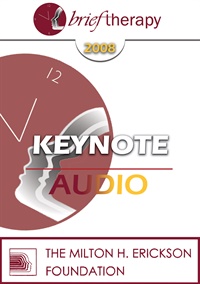
- Average Rating:
- Not yet rated
- Topic Areas:
- Keynotes | Brief Therapy | Children and Adolescent Therapy | Psychotherapy
- Categories:
- Brief Therapy Conference | Brief Therapy Conference 2008
- Faculty:
- Lenore Terr, MD
- Duration:
- 1:18:17
- Format:
- Audio Only
- Original Program Date:
- Dec 11, 2008
- Short Description:
- Between 2003 and 2006 Dr. Terr collected 48 vignettes form 34 child and adolescent psychiatrists describing turning points in young people's therapies. Before the turning point, the child patient had been making progress, at a standstill, or doing poorly. Afterward, he or she changed dramatically for the better. This keynote will present four aspects of these dramatic changes that therapists can easily keep in mind: the therapist's persona; the therapeutic atmosphere; the therapist's correct "read" of the child; and the therapeutic reaction. Many of these moments come with careful planning. But, just as many - or more - develop in a "blink."
- Price:
- $15.00 - Base Price
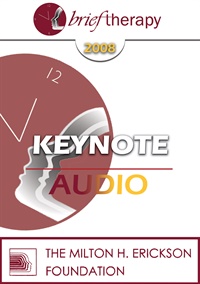
- Average Rating:
- Not yet rated
- Topic Areas:
- Keynotes | Brief Therapy | Affective Science | Belief Systems | Meditation, Spirituality and Yoga | Mindfulness | Positive Psychology
- Categories:
- Brief Therapy Conference | Brief Therapy Conference 2008
- Faculty:
- Joan Borysenko, PhD
- Duration:
- 59:33
- Format:
- Audio Only
- Original Program Date:
- Dec 12, 2008
- Short Description:
- Science and spirituality meet in this keynote. Drawing on her background as a cancer cell biologist and her work in behavioral medicine, Borysenko explores intuition, positive emotions, contemplative practice, and what she calls the “soul’s compass.” Blending neuroscience, story, and guided reflection, she invites therapists to consider guidance not as dogma, but as an embodied experience of presence, love, and aliveness that can orient both clinical work and personal life.
- Price:
- $15.00 - Base Price
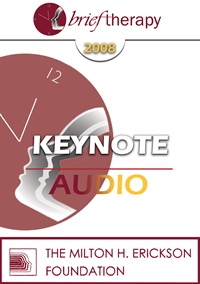
- Average Rating:
- Not yet rated
- Topic Areas:
- Keynotes | Brief Therapy | Therapist Development
- Categories:
- Brief Therapy Conference | Brief Therapy Conference 2008
- Faculty:
- Nicholas Cummings, PhD
- Duration:
- 1:00:39
- Format:
- Audio Only
- Original Program Date:
- Dec 12, 2008
- Short Description:
- National Health Reform is now considered inevitable, and many mental health practitioners are expecting this will rejuvenate their declining practices. Be aware, however, there will be strict standards on what conditions and interventions will be covered, and the list of what will be expected and what will likely be eliminated may shock you. Be prepared, tailor your practice appropriately now, and you will prosper.
- Price:
- $15.00 - Base Price
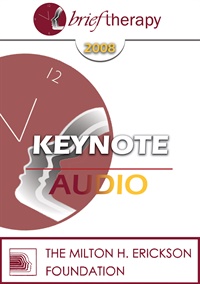
- Average Rating:
- Not yet rated
- Topic Areas:
- Keynotes | Brief Therapy | Community | Meditation, Spirituality and Yoga | Therapist Development
- Categories:
- Brief Therapy Conference | Brief Therapy Conference 2008
- Faculty:
- Jean Houston, PhD
- Duration:
- 1:03:17
- Format:
- Audio Only
- Original Program Date:
- Dec 13, 2008
- Short Description:
- Participants will learn how to incorporate sensory, psychological, mythic, spiritual and unitive states to bring personal potential to social change at a community, professional and cultural level.
- Price:
- $15.00 - Base Price
- Average Rating:
- Not yet rated
- Topic Areas:
- Couples Therapy | Keynotes | Brief Therapy | Relationships
- Categories:
- Brief Therapy Conference | Brief Therapy Conference 2010
- Faculty:
- Sue Johnson, EdD
- Course Levels:
- Master Degree or Higher in Health-Related Field
- Duration:
- 1:14:04
- Format:
- Audio and Video
- Original Program Date:
- Dec 09, 2010
- Short Description:
- Couple therapy will flourish as this field integrates research from social and neuropsychology and clarifies the processes that mediate change in love relationships. It will address more and more “individual” physical and mental health problems, relationship traumas and sexual issues. We can integrate science and the sizzle of “hot” emotion to transform individuals and relationships.
- Price:
-
Sale is $29.00
price reduced from Base Price - $59.00
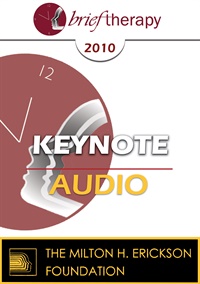
- Average Rating:
- Not yet rated
- Topic Areas:
- Attachment | Trauma | Keynotes | Brief Therapy
- Categories:
- Brief Therapy Conference | Brief Therapy Conference 2010
- Faculty:
- Bessel van der Kolk, MD
- Duration:
- 58:25
- Format:
- Audio Only
- Original Program Date:
- Dec 10, 2010
- Short Description:
- The study of psychological trauma has been accompanied by an explosion of knowledge about how experience shapes the central nervous system and the formation of the self. The study of trauma has probably been the single most fertile area in developing a deeper understanding of the relationship among the emotional, cognitive, social, and biological forces that shape human development.
- Price:
- $15.00 - Base Price
Tags: Trauma Attachment Brief Therapy
BT10 Keynote 04 - Core Tasks of Psychotherapy: What "Expert" Therapists Do - Donald Meichenbaum, PhD
- Average Rating:
- Not yet rated
- Topic Areas:
- Psychotherapy | Keynotes | Brief Therapy
- Categories:
- Brief Therapy Conference | Brief Therapy Conference 2010
- Faculty:
- Donald Meichenbaum, PhD
- Course Levels:
- Master Degree or Higher in Health-Related Field
- Duration:
- 1:03:27
- Format:
- Audio and Video
- Original Program Date:
- Dec 10, 2010
- Short Description:
- Following a brief discussion of the nature of expertise, the implications for psychotherapists will be considered. How to formulate collaboratively a Case Conceptualization Model that informs treatment decision -making will be presented. How to implement the Core Tasks of Psychotherapy and evidence-based behavioral change principles will be examined.
- Price:
-
Sale is $29.00
price reduced from Base Price - $59.00
Tags: Psychotherapy Brief Therapy
- Average Rating:
- Not yet rated
- Topic Areas:
- Psychotherapy | Keynotes | Eating Disorders
- Categories:
- Brief Therapy Conference | Brief Therapy Conference 2010
- Faculty:
- Thomas Szasz, MD
- Course Levels:
- Master Degree or Higher in Health-Related Field
- Duration:
- 1:28:23
- Format:
- Audio and Video
- Original Program Date:
- Dec 11, 2010
- Short Description:
- Millions of Americans are overweight or obese. Medication and psychotherapy may result in modest weight loss but nearly all regain weight within five years. The missing ingredient for successful treatment is cognition. To make permanent changes in their eating behavior, and thus their weight, individuals must learn how to change their dysfunctional ideas about food, eating, other people, and themselves and learn how to cope with a sense of unfairness, deprivation, disappointment, and discouragement. Cognitive behavioral approaches have been demonstrated to be effective for this problem.
- Price:
-
Sale is $29.00
price reduced from Base Price - $59.00
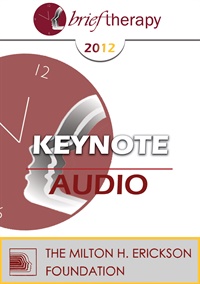
- Average Rating:
- Not yet rated
- Topic Areas:
- Keynotes
- Categories:
- Brief Therapy Conference | Brief Therapy Conference 2012
- Faculty:
- Robert Greenberg, PhD
- Duration:
- 1:58:07
- Format:
- Audio Only
- Original Program Date:
- Dec 06, 2012
- Short Description:
- BT12 Keynote 02 – Beethoven: Revolution, Reinvention, and Innovation with Attitude! – Robert Greenberg, PhD Louis (Ludwig) van Beethoven (1770-1827) was product of a violently dysfunctional upbringing. In the fall of 1802, at just the time his name and fame were beginning to spread across Europe, he suffered a suicidal depression. Through equal parts self-delusion and sheer will, Beethoven managed to reinvent himself personally and artistically as a hero battling fate itself. Thus armed, he emerged from his funk in early 1803, and proceeded to create a body of work unlike anything anyone had ever before imagined. Central to Beethoven’s new compositional vision was his conviction that his music be a vehicle for profound self-expression: his therapist’s couch. This program will explore Beethoven’s life and times and will then focus on his Symphony No. 5 as an example of how a piece of instrumental music can become—literally—a highly personalized confessional.
- Price:
- $15.00 - Base Price
Tags: Music Art and Creativity
- Average Rating:
- Not yet rated
- Topic Areas:
- Keynotes
- Categories:
- Brief Therapy Conference | Brief Therapy Conference 2012
- Faculty:
- Harriet Lerner, PhD
- Course Levels:
- Master Degree or Higher in Health-Related Field
- Duration:
- 1:02:38
- Format:
- Audio and Video
- Original Program Date:
- Dec 07, 2012
- Short Description:
- BT12 Keynote 03 – Remarkable Acts of Change: From Theory to Practice – Harriet Lerner, PhD Dr. Lerner will offer clinical examples of how she uses straightforward “coaching” that invites clients, in relatively few sessions, to experiment with bold acts of change that can change everything. She will outline the theoretical perspective that guides this work, and share her personal experience with systems- based remarkable acts of change.
- Price:
- $29.00 - Base Price
- Average Rating:
- Not yet rated
- Topic Areas:
- Keynotes | Addiction
- Categories:
- Brief Therapy Conference | Brief Therapy Conference 2012
- Faculty:
- Patrick Carnes, PhD, CAS
- Course Levels:
- Master Degree or Higher in Health-Related Field
- Duration:
- 1:07:07
- Format:
- Audio and Video
- Original Program Date:
- Dec 08, 2012
- Short Description:
- BT12 Keynote 04 – Bargains with Chaos: Challenges and Choices – Patrick Carnes, PhD, CAS We witness a continuous parade of stars, financial gurus, clergy, politicians and athletes who enter rehabs sometimes repetitively. Is this about media coverage or are these elite canaries in the coal mines of our culture signifying a greater danger? Our understanding of addictions with the aid of neuroscience is expanding dramatically. With it is the realization of cultural and scientific shifts which underline the therapist’s role in facing our number one public health problem. One of the gifts of this challenge is our growth in technology which will transform what every therapist does for a living and maybe how humans evolve. But maybe we professionals are like the famous—reluctant to face difficult realities.
- Price:
- $29.00 - Base Price
Tags: Addiction Neuroscience


